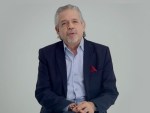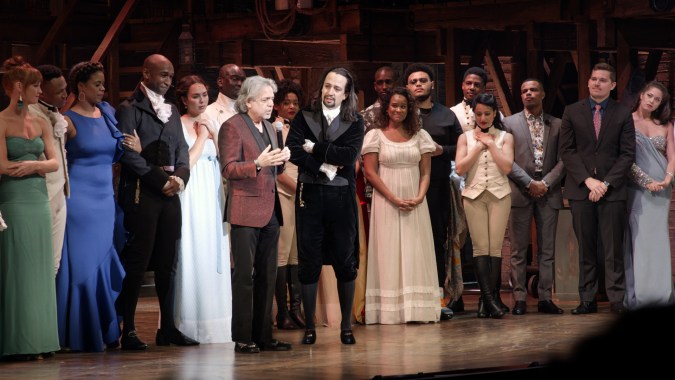Loving father. Compassionate humanitarian. Engaged political consultant and activist. Proud Puerto Rican. Or as his son, Broadway superstar son Lin-Manuel Miranda (Hamilton), refers to him in the new documentary Siempre, Luis, “a relentless motherf**ker.”
While it might be difficult to pin down all of the responsibilities that Luis A. Miranda, Jr. has acquired in nearly four decades, it’s safe to say that he’s a man who’s determined to get them all done.
In Siempre, Luis, first-time filmmaker John James follows Luis for an entire year as he globe-trots to various events to support his son Lin-Manuel, encourages his youngest son Miguel in his academics and makes a positive impact on the world through his work with charitable and political organizations. The latter includes empowering minorities to lift their voices in government and for social causes, traveling to his home island of Puerto Rico to help in the rebuilding effort after Hurricane Maria, and taking the lead in a crusade to bring Lin-Manuel’s hit Broadway play Hamilton to the Caribbean territory to raise funds for the arts.
Act Three will be his strongest yet.
Through heartfelt interviews with Miranda and his family, including Lin-Manuel and his wife Luz, and individuals who worked with him throughout his career, James is able to create a compelling portrait of an unbreakable man who is passionate about all the work he undertakes. James opens the film with Luis at the doctor’s office (Miranda suffered a heart attack in 2016). The scene is perhaps to prove to audiences that Mirando is actually human because what comes after is an endless wave of energy, emotion and earnestness.

If audiences learn anything about Miranda from Siempre, Luis, it is that when assembling a team for any job, it’s individuals like him who should fill the most important roles. Throughout the documentary, Miranda never slows down. His work ethic is both inspiring and exhausting, and Siempre, Luis, only proves that Act Three will be his strongest yet.
During an interview with Remezcla, Miranda talks about how closely his own story is tied to Hamilton, describes the spirit of Puerto Rico and explains what makes him truly immortal.
Siempre, Luis debuts on HBO October 6 at 9 p.m. EST.

When filmmakers pitched you a documentary on your life, what were your initial thoughts?
I was very flattered that anybody would think that what I’m doing—because it’s the right thing to do and because it makes me feel good doing it—is worth a documentary. [Director John James] was always amazed at the stuff that came out of my mouth—sometimes unfiltered, sometimes funny, sometimes enticing, but always thoughtful. I felt very humbled by the end result.
Something I learned from the film was that as Lin-Manuel was developing Hamilton, he was inspired by your own relentlessness when creating the title character. When did you realize that you were such a big part of the DNA of the production?
I remember him telling me that when he read [Ron] Chernow’s book Alexander Hamilton, the immediate parallel was that he was someone coming from the Caribbean at around 18 years old. That’s about the age I was when I came to New York from the Caribbean. Then, he took what he had internalized about me—that sense of urgency—and saw that Hamilton also brought that to his life and everything he did. So, for Lin-Manuel, it was a source he could go deep into to create the character.

Lin-Manuel refers to you as a “gatekeeper” in the documentary. What are the responsibilities of a gatekeeper and do you feel it is a job you are good at?
I am great at the job of gatekeeper. I don’t need to be liked in life. It is a need I do not have. Lin-Manuel has tons of demands for his job, but he still has to be a great husband and dad. So, there has to be time for all of that. It is my job to take the hundreds of requests that he gets, help sort them out, present them to him in an organized way and bounce ideas around that request. It is a job unto itself. Yesterday is a perfect example. I’m about to go to bed and my wife says, ‘By the way, I got a call from a friend of ours and they want to honor Lin-Manuel at this event.’ I looked at her and said, ‘The answer is no,’ and gave her a kiss, drank some water and went to bed.
I don’t need to be liked in life. It is a need I do not have.
The love you have for Puerto Rico is so evident in the film. Aside from the obvious things that probably make Puerto Rico so amazing like the culture, music and food, what makes it so special? How would you describe its spirit?
At the end of the day, a country is made by its people. Puerto Ricans are a people who, despite colonialism and being stepped on and being stripped of their culture and development, always rise to the occasion. Last summer, my wife and I stayed up every single night to watch the protests. I was so proud of that movement of regular people making a point to say, ‘I’m not going to tolerate this crap anymore.’ It is that spirit that I see in Puerto Ricans that I admire immensely.
After Hurricane Maria, when did you realize you weren’t going to be able to count on the U.S. federal government to do what they needed to do to heal the island in a timely manner and that people like you were going to have to pick up the slack?
I believe all our extended Latinx family and friends throughout the country were going to do anything and everything we could do to help Puerto Rico regardless of the federal response. That’s what family and concerned people do. I know that I am in a country where people care. A couple of days after Hurricane Maria, we realized that FEMA wasn’t ready. They didn’t have the personnel or equipment that they needed. People like [New York] Governor [Andrew] Cuomo and [New York] Mayor [Bill] de Blasio jumped into action right away as well as elected officials from other places and the Latino community. But we also had to advocate for the federal government to take action, particularly because we had a president who didn’t care about Puerto Rico.
At the end of the day, a country is made by its people.
As a political consultant who focused on Latino outreach for much of your life, can you explain why a coalition like Latinos for Trump exists?
As I tell my Republican friends, they’ve drank the Kool-Aid. I don’t think it’s a surprise to anybody—except the people who only pay attention to politics when the election is around the corner—that first-generation Cubans have voted Republican historically. Like 89% of Republicans, they support the candidate of their party. I think the issue is how do we convince many of them, particularly those that don’t drink the Kool-Aid, that Republicans aren’t the only ones who are fighting against dictators. They should be worried about a president [who] likes every dictator he meets.
You talk a bit about your own mortality in the film and what you hope to accomplish before it is all said and done. Do you ever think about legacy? Is there something you want people to remember you by?
I want them to remember me because I was a good dad. That is the most important job I have in life. That is the job I care about the most. Everything else is icing on the cake. You hope that your beliefs, your ideas, your energy lives in that next generation. Being a dad is what gives you immortality.




